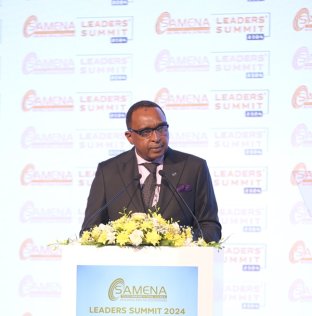Huawei continues to reaffirm its commitment to collaboration & technology advancement at the event
The 2024 edition of the SAMENA Telecommunications Council’s Leaders’ Summit, one of the world’s most highly-anticipated annual international meetings of the ICT industry leadership held recently, brought renowned regional and global private-sector players to also continue discussions from the last edition and the SAMENA Council’s earlier stakeholder roundtables and advocacy messaging done earlier during the current year.

A key partner in creating a legacy of stakeholder collaboration and demonstrating technological enablement via the Leaders’ Summit platform, Huawei continues to reaffirm its commitment to multi-stakeholder collaboration and innovation materialized annually through the Summit.
Speaking to Tahawultech on the sidelines of the forum, Bocar A. BA. Chief Executive Officer, SAMENA Telecommunications Council, said: “For over a decade, the Leaders’ Summit has positioned key issues and the Industry’s needs, private-sector players, and leaders. The key objective of the summit is to encourage and maintain investment through a proper regulatory framework. Today, the annual conference brings together stakeholders from government, the private sector, academia, technology providers, and big tech to discuss and redefine roles to promote digital development.”
“Building digital trust is crucial, involving cybersecurity and cyber safety to ensure network resilience. However, this requires significant investment. Thus, the discussion includes what incentives governments can provide to encourage private sector investment in cybersecurity. Additionally, the conference addresses the role of cloud infrastructure and artificial intelligence, highlighting AI’s benefits for consumers and citizens, as mentioned by His Excellency this morning. Investment, financing, and funding are essential, prompting discussions on unlocking access to capital.
The collaborative effort among all stakeholders is emphasized, with the aim of achieving consensus and developing positions that the GCC region can advocate for internationally.
According to him, the biggest challenge facing communication technology in the GCC and in general is that of aligning priorities. “Cooperation is essential; we cannot afford fragmentation. Digital development hinges on consistent access to connectivity, network safety, service availability, and affordability. Some countries are more advanced, and others should learn from them to create further investment and scale. This will enhance market enablement, providing the private sector with return on investment, and ensuring the sustainability of the digital economy, Bocar added.





